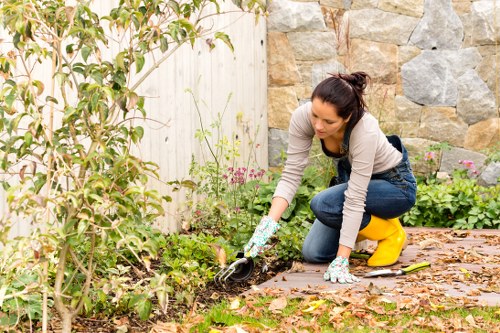Transform Your Outdoor Space: Expert Landscaping in Richmond

Richmond's unique climate and diverse soil types offer both challenges and opportunities for homeowners looking to enhance their outdoor spaces. Whether you're aiming for a serene garden retreat or a vibrant entertaining area, professional landscaping can make all the difference.
Understanding the local environment is crucial. Richmond experiences a humid subtropical climate, which means hot summers and mild winters. This affects plant selection, maintenance schedules, and overall design strategies.
Professional landscapers in Richmond are well-versed in selecting native plants that thrive in the region's conditions, ensuring your garden remains lush and vibrant year-round.

Why Choose Landscaping Services in Richmond?
Opting for professional landscaping in Richmond offers numerous benefits. From enhancing property value to creating a personalized outdoor oasis, the advantages are manifold.
**Boost Property Value:** A well-maintained landscape can significantly increase the curb appeal and overall value of your home.
**Energy Efficiency:** Strategic planting can provide natural shade, reducing cooling costs during the hot Richmond summers.

Key Elements of Richmond Landscaping
Successful landscaping incorporates several essential elements. Understanding these can help you collaborate effectively with your landscaper.
1. Plant Selection
Choosing the right plants is fundamental. Native species like azaleas, hydrangeas, and oak trees are excellent choices for Richmond's climate.
2. Hardscaping
Incorporate structures such as patios, walkways, and retaining walls to add functionality and aesthetic appeal.
3. Water Features
Elements like fountains or ponds can create a soothing ambiance and attract local wildlife.

Popular Landscaping Trends in Richmond
Staying updated with the latest trends can keep your garden looking fresh and contemporary.
- Sustainable Landscaping: Emphasizing eco-friendly practices, including rain gardens and xeriscaping.
- Outdoor Living Spaces: Creating areas for dining, lounging, and entertainment.
- Native Plant Gardens: Focusing on plants that are indigenous to Richmond.
Implementing these trends can make your landscape both stylish and sustainable.

Seasonal Landscaping Tips for Richmond Homeowners
Maintaining your landscape throughout the year requires seasonal adjustments.
Spring
Plant new flowers, fertilize the lawn, and perform any necessary pruning.
Summer
Ensure adequate watering and mulch to retain soil moisture during the hot months.
Fall
Clean up fallen leaves, plant bulbs for spring, and prepare your garden for the cooler weather.
Winter
Protect sensitive plants and plan for next year's landscape improvements.
Choosing the Right Richmond Landscaping Company
Selecting a reputable landscaping company is pivotal to the success of your project.
- Experience: Look for companies with a proven track record in Richmond.
- Portfolio: Review their previous work to gauge their style and quality.
- Reviews: Check testimonials and online reviews for customer satisfaction.
- Licensing and Insurance: Ensure they are properly licensed and insured to protect your property.
By considering these factors, you can choose a landscaping partner that aligns with your vision.
Cost Factors in Richmond Landscaping Projects
Budgeting is an essential aspect of any landscaping project. Several factors influence the overall cost.
- Project Scope: Larger projects with more elements naturally cost more.
- Material Quality: High-quality materials may have a higher upfront cost but offer better longevity.
- Labor Costs: Skilled labor can ensure better results but may come at a premium.
- Design Complexity: Intricate designs require more time and expertise.
Understanding these factors can help you plan your budget effectively.
Maintenance Tips for Richmond Landscapes
Proper maintenance ensures your landscape remains beautiful and healthy.
Regular Watering
Maintain a consistent watering schedule, especially during dry spells, to keep plants thriving.
Pruning and Trimming
Regularly prune shrubs and trees to promote healthy growth and maintain desired shapes.
Weed Control
Keep weeds at bay through mulching and appropriate herbicide use.
Soil Health
Enhance soil fertility with compost and organic matter to support plant health.
Eco-Friendly Landscaping Solutions
Incorporating sustainable practices can benefit both your garden and the environment.
- Rainwater Harvesting: Collect and utilize rainwater for irrigation.
- Native Planting: Use native species that require less water and maintenance.
- Composting: Recycle garden waste to create nutrient-rich compost.
- Solar Lighting: Illuminate your garden with energy-efficient solar-powered lights.
Embracing these green practices contributes to a sustainable and low-maintenance landscape.
Enhancing Curb Appeal with Richmond Landscaping
Your home's first impression is heavily influenced by its landscape. Strategic design elements can significantly boost curb appeal.
Entryways
Create inviting entryways with well-placed lighting, flowering plants, and decorative pathways.
Lawn Care
Maintain a lush, green lawn through regular mowing, fertilizing, and aeration.
Symmetry and Balance
Design your landscape with symmetrical elements to create a balanced and harmonious look.
Seasonal Color
Incorporate plants that offer vibrant colors in different seasons to keep your garden attractive year-round.
Outdoor Lighting Strategies
Proper lighting can transform your garden, enhancing both beauty and security.
- Pathway Lighting: Guides visitors and highlights walkways.
- Accent Lighting: Highlights key features like trees or sculptures.
- Ambient Lighting: Creates a warm and inviting atmosphere for evening gatherings.
- Security Lighting: Deters intruders and increases safety around your property.
Investing in quality outdoor lighting can elevate the overall look and functionality of your landscape.
Integrating Water Management in Landscaping
Effective water management is essential for a sustainable landscape.
Irrigation Systems
Install automated irrigation systems to ensure consistent watering and reduce water waste.
Rain Gardens
Utilize rain gardens to capture and filter stormwater runoff, preventing erosion and pollution.
French Drains
Implement French drains to redirect excess water away from your home’s foundation.
Permeable Pavers
Use permeable pavers for pathways and patios to allow water infiltration and reduce runoff.
Gardening Tips for Richmond's Climate
Adapting your gardening practices to Richmond's climate can lead to a flourishing garden.
- Soil Testing: Regularly test soil pH and nutrient levels to optimize plant health.
- Mulching: Apply mulch to conserve moisture and suppress weeds.
- Pest Control: Monitor for common pests and implement eco-friendly control methods.
- Plant Rotation: Rotate plant species to prevent soil depletion and reduce disease risk.
These practices contribute to a resilient and thriving landscape.
Creating Functional Outdoor Spaces
Designing functional outdoor spaces can enhance your lifestyle and provide versatile areas for various activities.
Patios and Decks
Create spaces for dining, relaxing, and entertaining with well-designed patios and decks.
Outdoor Kitchens
Expand your cooking capabilities with outdoor kitchens, perfect for summer gatherings.
Fire Pits and Fireplaces
Add warmth and ambiance to your garden with fire pits or outdoor fireplaces.
Recreational Areas
Incorporate areas for sports, play, or hobbies to make the most of your outdoor space.
Landscape Design Inspirations
Draw inspiration from various design styles to create a unique and personalized landscape.
- Modern Minimalist: Clean lines and simple plant selections for a sleek look.
- Traditional: Classic plantings and structures that offer timeless beauty.
- Japanese Zen: Incorporate elements like rock gardens, bamboo, and water features for tranquility.
- Rustic: Use natural materials and native plants for a down-to-earth aesthetic.
Choosing a design style that resonates with you ensures your landscape reflects your personal taste.
Benefits of Professional Landscape Design
Hiring a professional landscape designer brings expertise and a fresh perspective to your project.
Customized Plans
Professionals create tailored designs that meet your specific needs and preferences.
Efficient Execution
Experienced landscapers ensure projects are completed on time and within budget.
Access to Resources
Benefit from their network of suppliers and access to high-quality materials and plants.
Maintenance Support
Ongoing maintenance services keep your landscape looking its best throughout the year.
Innovative Landscaping Technologies
Embrace modern technologies to enhance your landscape's functionality and sustainability.
- Smart Irrigation: Automated systems that adjust watering based on weather conditions.
- LED Lighting: Energy-efficient lighting options for various outdoor spaces.
- Vertical Gardens: Space-saving solutions for growing plants on walls and structures.
- Drones: Utilize drones for landscape surveying and project planning.
Integrating these technologies can streamline maintenance and improve your garden's overall efficiency.
Seasonal Planting Strategies
Adapting your planting strategies to the seasons ensures your landscape remains vibrant all year long.
Spring Planting
Focus on planting annuals and perennials that bloom in the warmer months.
Summer Care
Provide ample water and shade to help plants thrive during the heat.
Autumn Preparations
Plant bulbs and prepare perennials for the winter months.
Winter Protection
Cover sensitive plants and mulch to protect roots from freezing temperatures.
Enhancing Privacy with Landscaping
Create private outdoor spaces by strategically designing your landscape.
- Hedges and Screens: Plant dense hedges to block unwanted views and create secluded areas.
- Fencing: Install fences that complement your landscape while providing security.
- Privacy Trees: Use tall trees to act as natural barriers.
- Pergolas and Trellises: Add structures that offer both privacy and aesthetic appeal.
These elements enhance your outdoor privacy without compromising on style.
Eco-Conscious Landscaping Practices
Adopting eco-conscious practices contributes to a healthier environment and a sustainable garden.
Composting
Recycling organic waste into compost enriches the soil and reduces landfill waste.
Rainwater Harvesting
Collecting rainwater minimizes dependence on municipal water supplies and reduces runoff.
Solar-Powered Features
Integrate solar lights and water pumps to decrease energy consumption.
Native Plantings
Use native plants that require less water and are more resistant to local pests and diseases.
Maximizing Small Outdoor Spaces
Even with limited space, you can create a beautiful and functional landscape.
- Vertical Gardens: Utilize walls and fences for planting to save ground space.
- Container Gardening: Grow plants in pots and containers to add flexibility.
- Multi-Functional Furniture: Choose furniture that serves multiple purposes, such as storage benches.
- Mirrors and Light Colors: Use reflective surfaces and light hues to make the space appear larger.
These strategies help you make the most of smaller outdoor areas.
Integrating Art and Decor in Landscapes
Artistic elements can add personality and uniqueness to your garden.
Garden Sculptures
Decorative sculptures serve as focal points and conversation starters.
Water Features
Incorporate artistic fountains or ponds to enhance visual appeal.
Decorative Pathways
Use mosaics or patterned stones to create visually interesting walkways.
Outdoor Art Installations
Install murals or artistic installations that reflect your personal style.
Accessible Landscaping for All
Designing accessible landscapes ensures your outdoor space is usable by everyone.
- Wide Pathways: Ensure pathways are wide and smooth for easy navigation.
- Level Surfaces: Avoid slopes and steps that can pose challenges.
- Accessible Seating: Provide seating areas that are easily reachable and comfortable.
- Adaptive Features: Incorporate features like raised beds for easier gardening.
Creating an accessible landscape promotes inclusivity and enhances usability.
Lighting Design for Nighttime Beauty
Effective lighting can transform your landscape after dark, highlighting its beauty and ensuring safety.
Pathway Lighting
Illuminate walkways to guide visitors and prevent accidents.
Spotlighting
Highlight architectural features and standout plants with focused lighting.
Ambient Lighting
Create a welcoming atmosphere with soft, ambient lighting in seating areas.
Energy-Efficient Options
Choose LED or solar-powered lights to reduce energy consumption.
Advanced Irrigation Techniques
Implementing advanced irrigation systems can conserve water and enhance plant health.
- Drip Irrigation: Delivers water directly to plant roots, minimizing evaporation.
- Smart Controllers: Adjust watering schedules based on weather data.
- Rain Sensors: Prevents overwatering by detecting rainfall.
- Zoning: Allows for different watering needs across various landscape areas.
These techniques improve efficiency and ensure your plants receive the optimal amount of water.
Enhancing Wildlife in Your Garden
Attracting wildlife can add life and diversity to your landscape.
Bird-Friendly Plants
Plant species that provide food and shelter for local bird species.
Butterfly Gardens
Include nectar-rich flowers to attract butterflies and other pollinators.
Water Sources
Provide water features like birdbaths or small ponds to support wildlife.
Insect Hotels
Create habitats for beneficial insects that aid in pollination and pest control.
Choosing the Right Trees for Your Landscape
Trees are a foundational element of any landscape, offering shade, structure, and beauty.
- Shade Trees: Oaks, maples, and elm trees provide extensive canopy cover.
- Ornamental Trees: Cherry blossoms and dogwoods add seasonal color and visual interest.
- Fruit Trees: Apple, peach, and plum trees offer both aesthetic and practical benefits.
- Evergreen Trees: Pines and spruces maintain their foliage year-round for consistent greenery.
Selecting the right trees ensures long-term health and enhances the overall landscape design.
Integrating Technology in Landscaping
Modern technology can streamline landscape management and enhance design.
Smart Irrigation Systems
Automate watering schedules to optimize water usage and reduce manual effort.
Landscape Design Software
Use software tools to visualize and plan your landscape before implementation.
Drones for Surveying
Employ drones to assess large landscapes quickly and accurately.
Automated Lighting
Control outdoor lighting remotely to adjust scenes and enhance security.
Creating Sustainable Landscapes
Focus on sustainability to create a landscape that benefits both you and the environment.
- Permeable Surfaces: Reduce runoff and promote groundwater recharge.
- Energy-Efficient Lighting: Lower energy consumption with LED and solar lights.
- Organic Gardening: Avoid synthetic chemicals to maintain healthy soil and water.
- Biodiversity: Plant a variety of species to support a balanced ecosystem.
Sustainable practices ensure your landscape remains healthy and eco-friendly for years to come.
Customizing Your Landscape Design
Tailor your landscape to reflect your personal style and meet your specific needs.
Personal Preferences
Incorporate elements that resonate with your taste, whether it's a formal garden or a rustic retreat.
Functionality
Design spaces that cater to your lifestyle, such as play areas for children or quiet zones for relaxation.
Budget Considerations
Plan your design around your budget, prioritizing essential elements and allowing for future expansions.
Future Growth
Consider the growth patterns of plants and the potential evolution of your landscape over time.
Enhancing Your Garden with Lighting
Proper light placement can transform your garden into a magical nighttime space.
- String Lights: Add a whimsical touch to patios and pergolas.
- Spotlights: Highlight specific plants or architectural features.
- Floodlights: Provide security and illuminate larger areas.
- Underwater Lights: Enhance the beauty of ponds and fountains.
Investing in a well-planned lighting system can extend the usability and beauty of your landscape into the night.
Sustainable Planting Practices
Adopting sustainable planting practices ensures your landscape remains healthy and environmentally friendly.
Native Plants
Use plants that are native to Richmond to reduce water usage and support local wildlife.
Organic Fertilizers
Choose organic options to enhance soil health without harming the environment.
Mulching
Apply mulch to retain moisture, suppress weeds, and improve soil quality.
Crop Rotation
Rotate plant species to prevent soil depletion and reduce pest infestations.
Designing for Year-Round Appeal
Create a landscape that looks beautiful in every season by incorporating diverse plantings and design elements.
- Spring Blooms: Plant tulips, daffodils, and magnolias for vibrant spring displays.
- Summer Foliage: Use lush, green plants to thrive in the summer heat.
- Autumn Colors: Incorporate trees and shrubs with colorful fall foliage.
- Winter Interest: Use evergreens, ornamental grasses, and winter-blooming plants for year-round appeal.
By planning for each season, your landscape remains engaging and attractive throughout the year.
Water Conservation in Landscaping
Implementing water conservation techniques is essential in sustainable landscaping.
Efficient Irrigation Systems
Install drip or soaker hoses to minimize water waste and deliver water directly to plant roots.
Rain Barrels
Collect and store rainwater for use in your garden, reducing reliance on municipal water sources.
Drought-Resistant Plants
Choose plants that require less water, especially during dry periods.
Soil Improvement
Enhance soil with organic matter to increase its water-holding capacity.
Incorporating Edible Gardens
Grow your own fruits, vegetables, and herbs to enjoy fresh, homegrown produce.
- Raised Beds: Create raised garden beds for better soil control and drainage.
- Vertical Gardening: Maximize space by growing vertically on trellises or walls.
- Companion Planting: Plant complementary species together to enhance growth and reduce pests.
- Herb Gardens: Grow a variety of herbs for culinary and medicinal uses.
Edible gardens not only provide fresh produce but also add to the beauty and functionality of your landscape.
Professional Landscaping Services
Partnering with professional landscapers ensures your project is executed with expertise and precision.
Consultation and Planning
Experts assess your space and work with you to design a plan that meets your goals.
Installation
Skilled landscapers handle the installation of plants, hardscaping, and other elements efficiently.
Maintenance
Ongoing maintenance services keep your landscape healthy and looking its best.
Customization
Tailor your landscape with customized solutions that reflect your personal style.
Enhancing Outdoor Living
Expand your living space outdoors to enjoy nature and entertain guests.
- Decks and Patios: Create flat surfaces for seating, dining, and recreation.
- Outdoor Kitchens: Equip your garden with cooking facilities for outdoor meals.
- Fire Features: Add fireplaces or fire pits for warmth and ambiance.
- Comfortable Seating: Invest in quality outdoor furniture for relaxation.
Enhancing outdoor living areas allows you to fully utilize your landscape for enjoyment and entertainment.
Final Thoughts on Landscaping in Richmond
Investing in professional landscaping in Richmond can transform your outdoor space into a beautiful, functional, and sustainable environment.
With a focus on local plant selection, sustainable practices, and personalized design, your landscape can thrive in Richmond's unique climate.
Whether you're looking to boost your home's curb appeal, create a private retreat, or develop an entertaining space, expert landscapers are here to help you achieve your vision.
Contact us today to start your landscaping journey and transform your Richmond property into the garden of your dreams.

